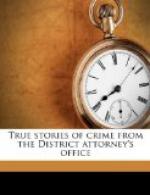But the evil did not stop there. Seeing that their brothers prospered in New York, and neither being learned in the law nor gifted with the power of nice discrimination between rogueries, all the other knaves in the country took it for granted that they had at last found the Elysian fields and came trooping here by hundreds to ply their various trades. The McCord case stood out like a cabalistic sign upon a gate-post telling all the rascals who passed that way that the city was full of honest folk waiting to be turned into rogues and “trimmed.”
“And presently we did
pass a narrow lane, and at the mouth espied a
written stone, telling beggars
by a word like a wee pitchfork to go
that way.”
The tip went abroad that the city was “good graft” for everybody, and in the train of the “wire-tappers” thronged the “flimflammer,” “confidence man,” “booster,” “capper” and every sort of affiliated crook, recalling Charles Reade’s account in “The Cloister and the Hearth” of Gerard in Lorraine among their kin of another period:
With them and all they had, ’twas lightly come and lightly go; and when we left them my master said to me, “This is thy first lesson, but to-night we shall be at Hansburgh. Come with me to the ‘rotboss’ there, and I’ll show thee all our folk and their lays, and especially ‘the lossners,’ ‘the dutzers,’ ‘the schleppers,’ ’the gickisses,’ ‘the schwanfelders,’ whom in England we call ’shivering Jemmies,’ ‘the suentregers,’ ‘the schwiegers,’ ‘the joners,’ ’the sessel-degers,’ ‘the gennscherers,’ in France ’marcandiers a rifodes,’ ‘the veranerins,’ ‘the stabulers,’ with a few foreigners like ourselves, such as ‘pietres,’ ‘francmitoux,’ ‘polissons,’ ‘malingreux,’ ‘traters,’ ‘rufflers,’ ‘whipjacks,’ ‘dommerars,’ ‘glymmerars,’ ‘jarkmen,’ ‘patricos,’ ‘swadders,’ ‘autem morts,’ ’walking morts,’—” “Enow!” cried I, stopping him, “art as gleesome as the evil one a counting of his imps. I’ll jot down in my tablet all these caitiffs and their accursed names: for knowledge is knowledge. But go among them alive or dead, that will I not with my good will.”
And a large part of it was due simply to the fact that seven learned men upon seven comfortable chairs in the city of Albany had said, many years ago, that “neither the law or public policy designs the protection of rogues in their dealings with each other, or to insure fair dealing and truthfulness as between each other, in their dishonest practices.”
The reason that the “wire-tapping” game was supposed to come within the scope of the McCord case was this: it deluded the victim into the belief that he was going to cheat the pool room by placing a bet upon a “sure thing.” Secondarily it involved, as the dupe supposed, the theft or disclosure of messages which were being transmitted over the lines of a telegraph company—a misdemeanor. Hence, it was argued, the victim was as much a thief as the proposer of the scheme, had parted with his money for a dishonest purpose, did not come into court with “clean hands,” and no prosecution could be sustained, no matter whether he had been led to give up his money by means of false pretences or not.




